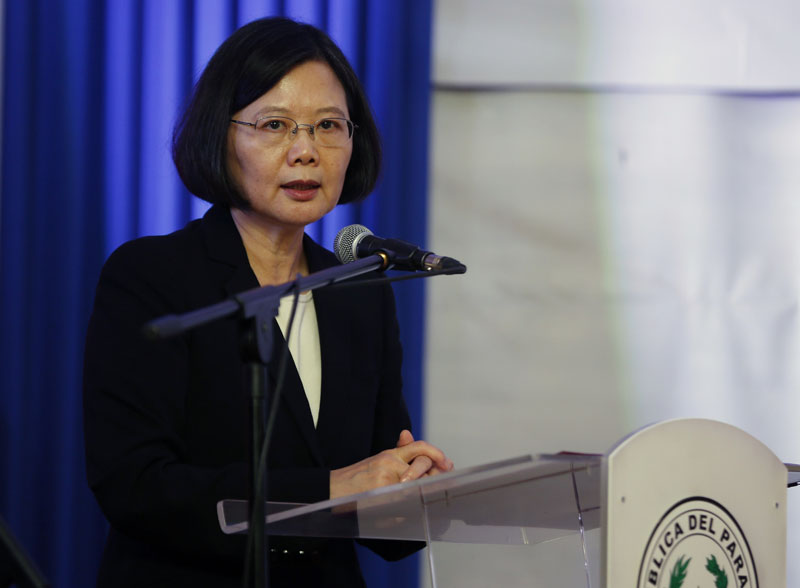Taiwan president says won't bow to Beijing, calls for talks
TAIPEI: Taiwan's new president Tsai Ing-wen said Monday her self-ruled island will not bow to Beijing's pressure and that China should recognise her government's existence and engage with it in talks, in remarks likely to further anger China.
Speaking in a National Day address, Tsai acknowledged that ties between Taiwan and China in recent months have been bumpy.
"But we will not bow to pressure, and we will of course not revert to the old path of confrontation," she said at a ceremony outside the Presidential Office Building in central Taipei attended by 11,000 people, including more than 360 foreign guests.
China should "face up to the reality" of the Taiwanese government's existence and of the island's democracy, Tsai said, adding the two sides should "sit down and talk as soon as possible."
China claims Taiwan is its own territory, to be brought under its control by force if necessary. Tsai's election in January upendedBeijing's strategy of using economic inducements to convince Taiwanese that political unification is not only inevitable but also in their best interests.
In her address, Tsai said her government wants to maintain the status quo — referring to the state of tense but stable peace and robust economic exchanges between the sides, which split amid China's civil war in 1949.
However, China has said it isn't satisfied with that position and demands she endorse Beijing's formulation that the two are part of a single Chinese nation that was embraced by her predecessor Ma Ying-jeou, who was seated on the stage at the ceremony.
Tsai's reluctance to do so, and risk alienating her party's supporters, clashes with her hopes for renewed talks between the sides that Beijing cut off shortly after her May inauguration, said Liu Yi-jiun, a professor of public affairs professor at Taiwan's Fo Guang University.
"So far I just don't see anything happening at this time," Liu said. "(Tsai) really wants her counterparts to sit down and find some solution. That's something positive. But I don't think these kinds of words will turn the situation around."
Whether Taiwan's public likes the speech is hard to say because it covers "nothing" new," Liu said, adding that China "will just carry on."
Tsai's reference to the need to maintain progress made since a breakthrough 1992 meeting between the sides — and her use ofTaiwan's official name, the Republic of China, could be seen by Beijing as a positive sign that she intends no radical moves toward formal independence, said Nathan Liu, an international affairs professor at Ming Chuan University in Taipei.
If China instead insists on maintaining the current stalemate, "that's not going to help," he said.
There was no immediate response to the speech from Beijing.
However, in a statement issued Thursday, a spokesman for the government's Taiwan Affairs Office said Beijing would not budge from its bottom line demands and would oppose any steps toward Taiwanese independence.
"No force, no person should underestimate the steadfast determination of the 1.3 billion people of the (Chinese) mainland," An Fengshan was quoted as saying.
Taiwan prison authorities declined to let former Taiwan president Chen Shui-bian out of house arrest to attend the event. Chen, elected to office in 2000 as the candidate of Tsai's Democratic Progressive Party, is serving a sentence for corruption. China despised Chen for his pursuit of greater independence for Taiwan.
Formations of troops outside the presidential office at Monday's ceremony were lighter than in previous years when large amounts of military hardware rolled past the Presidential Office Building in a gesture of strength to China.
Elsewhere in her speech, Tsai discussed plans to strengthen the island's high-tech, export-dependent economy and improve opportunities for young people.






